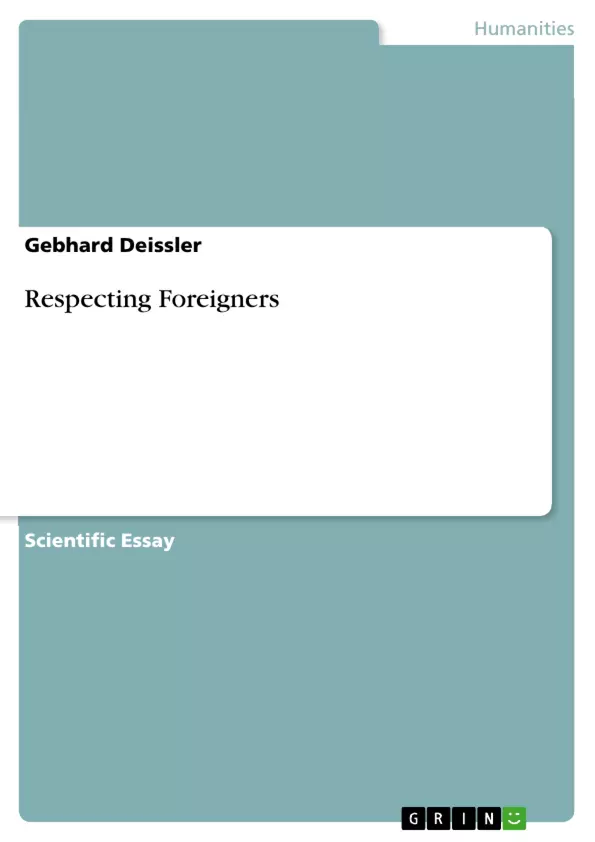The exposé elaborates on the I-We-They Principle, which refers to the perception of oneself, one’s own cultural group as well as that of other cultural groups. Perceived distance and complexity condition our thinking and feeling about people from other cultures. Greater distance, lesser complexity and negative judgement correspond and smaller distance, greater complexity and positive judgements also go hand in hand.
Inhaltsverzeichnis (Table of Contents)
- Respecting Foreigners
- The I-We-They Principle
- Perceived Distance and Complexity
- The Term "Foreigner"
- The Reduction of Complexity
- Increasing Perceived Distance
- Harmonization and Normalization of Intercultural Relations
- Decreasing Distance and Increasing Complexity
- A Real-Life Example
- Cultural Adaptation and Integration
- Examples are More Educational than Theoretical Considerations
- Fundraising Campaign for the Spanish Library Association
- Cultural Identity and Needs
Zielsetzung und Themenschwerpunkte (Objectives and Key Themes)
This exposé aims to explore the complex relationship between perceived distance and complexity in intercultural encounters. It examines how our perceptions of "foreigners" can lead to prejudice and a reduction of their humanity. The author proposes that increasing complexity and decreasing distance through positive interactions is key to fostering intercultural understanding and cooperation.
- The I-We-They Principle
- The Impact of Perceived Distance on Complexity and Judgment
- The Role of Language and Communication in Intercultural Interactions
- The Importance of Cultural Identity and Needs
- The Benefits of Positive Intercultural Interactions and Integration
Zusammenfassung der Kapitel (Chapter Summaries)
- The text begins by introducing the I-We-They principle, which highlights the tendency to perceive "self" as complex, "we" as less complex, and "they" (foreigners) as simple. The author argues that this principle often leads to prejudice and a distorted view of people from other cultures.
- The author explores how the term "foreigner" itself implies a sense of otherness and distance, reducing complexity and humanity. This, in turn, can lead to negative judgments and a lack of respect for cultural differences.
- The text then focuses on the role of language and communication in intercultural interactions. The author argues that positive interactions, even with limited language skills, can help bridge the gap between cultures, increase complexity, and foster a sense of shared humanity.
- The author provides a real-life example of how a positive interaction between a cashier and a foreign customer can lead to increased complexity and a feeling of acceptance. The author suggests that such interactions are essential for successful integration and cultural adaptation.
- Finally, the author draws upon personal experience to illustrate the importance of acknowledging and supporting the cultural needs of immigrants. Through a fundraising campaign for the Spanish Library Association, the author highlights how recognizing the cultural identity and needs of immigrants can foster a sense of belonging and respect.
Schlüsselwörter (Keywords)
Key terms and concepts explored in this text include the I-We-They Principle, perceived distance, complexity, intercultural communication, cultural identity, cultural needs, integration, prejudice, and respect. The text emphasizes the importance of promoting positive intercultural interactions and reducing prejudice by fostering a greater understanding of cultural differences.
Frequently Asked Questions
What is the "I-We-They" Principle in intercultural relations?
The principle describes how we perceive ourselves as complex, our own group (We) as slightly less complex, and other groups (They/Foreigners) as simple or one-dimensional.
How does perceived distance affect our judgment of other cultures?
Greater perceived distance often leads to lower complexity in thinking and negative judgments, while smaller distance promotes positive judgments and a deeper understanding.
Why is the term "foreigner" problematic according to the text?
The term itself can imply "otherness" and distance, which reduces the perceived complexity and humanity of the individual, often leading to prejudice.
What is key to fostering intercultural understanding?
Increasing complexity and decreasing distance through positive, real-life interactions and integration efforts is essential for mutual respect.
How do language skills impact intercultural integration?
While language is important, the text argues that even with limited skills, positive communication can bridge gaps and foster a sense of shared humanity.
- Quote paper
- D.E.A./UNIV. PARIS I Gebhard Deissler (Author), 2010, Respecting Foreigners, Munich, GRIN Verlag, https://www.grin.com/document/159901



